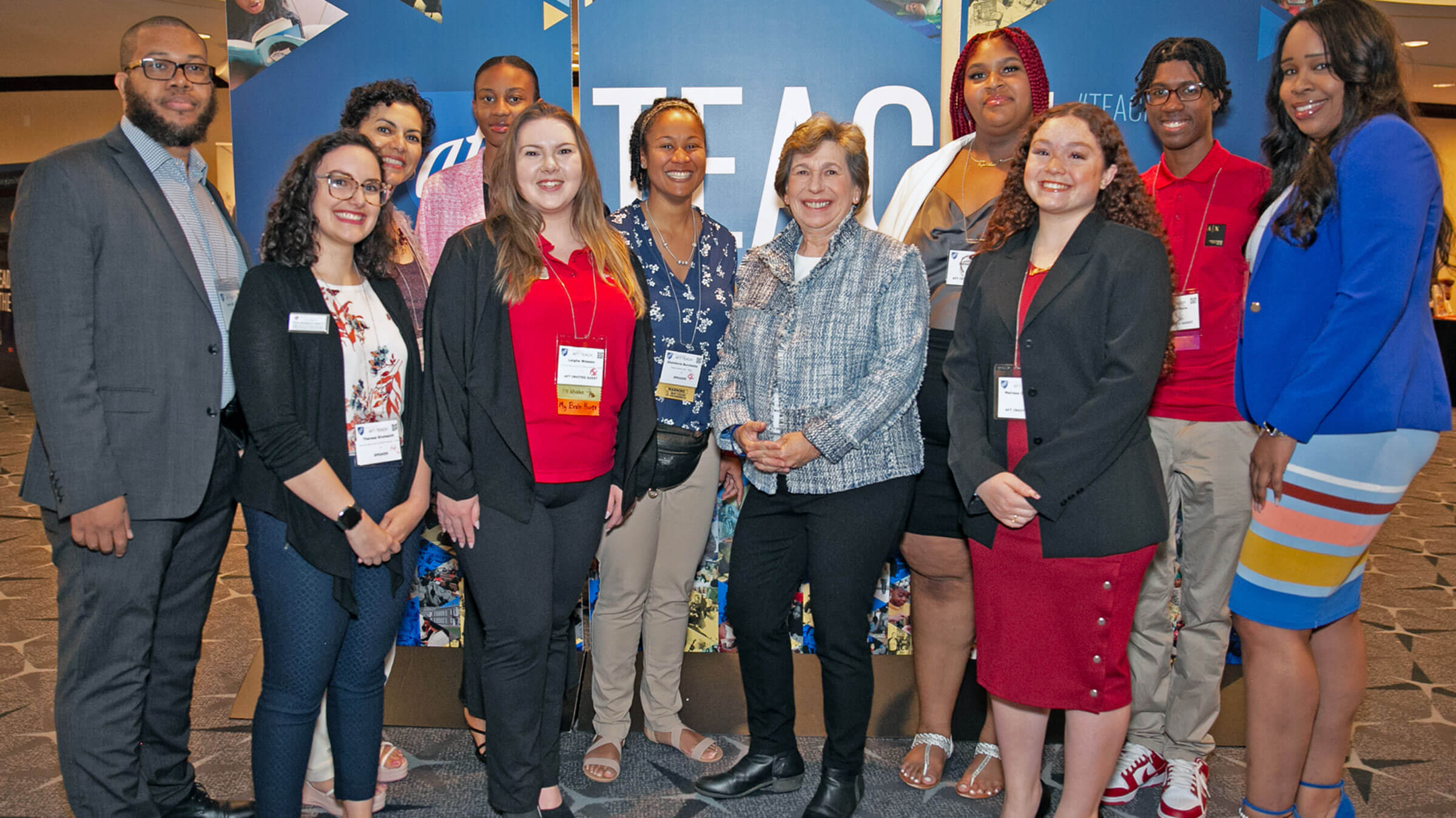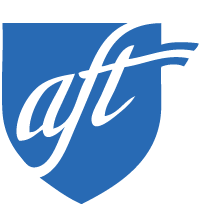Real solutions for kids and communities
America’s educators are addressing hard issues like loneliness, learning loss and literacy.

Weingarten, center, with students and educators attending the AFT’s TEACH conference in Washington, D.C., July 21. Photo by Suzannah Hoover
What are the carefree days of summer like for America’s teachers? Many may wonder as they plan their lessons whether topics they teach and books they offer students will get caught up, baselessly, in the tempest of the culture wars. They might hear presidential hopefuls slander dedicated teachers as “groomers” who teach “filth.” More than 1,000 educators spent part of their “break” at the American Federation of Teachers’ TEACH conference this summer in sweltering Washington, D.C., for some sizzling professional development. That’s who educators are—focusing on their students and their craft, no matter what is swirling around them.
Sadly, as educators give their all to help students, extremists continue to demonize and demagogue public schools, never offering a single idea to strengthen them. Because they don’t want to improve public education, they want to end it.
One way is by defunding public education. As I write this, Republicans on the House Appropriations Committee are trying to slash billions of dollars in funding for public education, including gutting Title I by 80 percent. This would cause unconscionable harm. Nearly 90 percent of school districts rely on Title I to improve education opportunities and help close achievement gaps for students from low-income families.
When these extremists aren’t trying to cut public school funding, they are diverting it to private and religious schools through vouchers, despite vouchers’ dismal track record.
As others undermine the public schools 90 percent of American students attend, educators are helping their students recover and thrive. I’ve seen it in classrooms all over the country. What I have witnessed, and what research has proven, together form a set of strategies and solutions that will help students and strengthen public education.
These strategies address students’ loneliness, learning loss and literacy, and they are at the center of the AFT’s new $5 million campaign, Real Solutions for Kids and Communities.
Our goal is to:
- Unlock the power and possibility that come from being a confident reader.
- Catalyze a vast expansion of community schools that meaningfully partner with families.
- Ensure that all children have opportunities to learn by doing—engaging in experiential learning, including career and technical education.
- Care for young people’s mental health and well-being, including by demanding that social media companies protect, not prey on, children.
- And fight for the teaching and support staff, and the resources, students need to thrive.
It starts with reading, the foundation for all academic learning.
The AFT’s Reading Opens the World program has given away 1.5 million books to children and families over the last year—and we’re giving away 1 million more. And the AFT is partnering with WETA on Reading Universe, a new online resource offering educators free access to evidence-based strategies for reading instruction to help kids become confident and joyful readers.
Another solution is experiential learning—learning by doing: like third graders in Washington, D.C., who role-play that they are officials addressing real issues affecting their city, and chemistry students in Cincinnati who get out of an escape room (their classroom) by solving puzzles that embed the content they just learned.
Career and technical education is experiential learning at its best, and it prepares students not only for traditional trades programs, but also for careers in healthcare, information technology and skilled manufacturing.
Experiential learning prepares students for the opportunities of tomorrow, and community schools help solve the challenges students and families confront today.
Community schools wrap academics, healthcare, mental health services, food assistance and much more around public schools—supports that students and families need to learn and live. Through meaningful partnerships with families and deep community engagement, they become centers of their communities.
AFT members have helped create more than 700 community schools across the country, and we are part of a movement calling for 25,000 community schools by 2025.
We are working with parent and student groups to counter the harmful impacts of social media and the nefarious practices of social media companies. In our new report, “Likes vs. Learning: The Real Cost of Social Media for Schools,” we call on social media platforms to make fundamental changes to prioritize safety for children—such as turning on the strongest safety features by default, and implementing safeguards that deter students from overuse and addictive behavior and protect students’ privacy.
Of course, we need appropriate funding for our public schools and the three R’s: educator recruitment, retention and respect, so all students have the educators they need.
These solutions are worthy on their own; together, they are transformational. My union is doing everything we can to spread and sustain them. And they should be a national priority.
I believe, as America’s educators address hard issues like loneliness, learning loss and literacy, we will have not only long-term allies rooting us on, but also people with whom we have sometimes been at odds. Because we all want our young people to recover and thrive.













